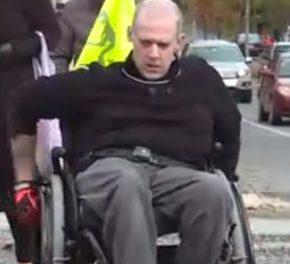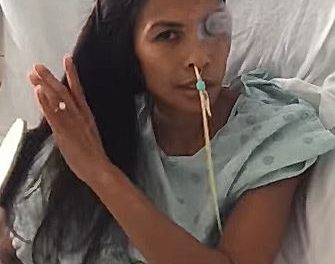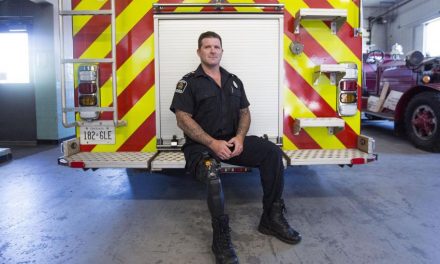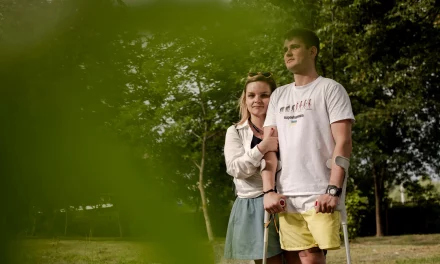One of them approached her, tears streaming down her face. “I finally found friends,” said the woman, who had traveled from Canada to Los Angeles to take Chelsie’s dance class. “It’s because of you.” That brought Chelsie back to eight years prior, adjusting to life in a wheelchair and looking for community herself. “The one thing that saved me was finding other people like me,” she says. Now, she’s the one building that community for others.
Chelsie fell in love with dance at age 3 and was competing nationally by age 5. She was the only freshman at her high school near Monterey, California, to make the dance team. Her senior year, she won the California state championship. Chelsie was preparing for nationals when the unthinkable happened in February 2010.
She caught a ride home from a party with a friend, and the car—packed with teens—sped through a flashing yellow sign in a wooded area. It then careened over a curb and down an embankment, hitting a tree head-on at 35 miles per hour. Most of what Chelsie remembers is sensations, or the lack thereof: the pain in her back, which was broken instantly; the paramedics’ tests on her legs, which she couldn’t feel; the deep breaths she took before she was Life Flighted to the nearest trauma center.
Chelsie woke up with her hands tied to the bed and a tube down her throat, knowing something big had happened. She floated in and out of consciousness (and the operating room) for two weeks as friends and classmates lined the hospital hallways to see her. When she finally came to, doctors carefully explained that she had suffered a spinal cord injury and would never walk again.
“I don’t just walk,” Chelsie replied. “I dance.”
“I’m so sorry,” her doctor said. “You’re not going to be able to do that anymore.”
Then, a question: “Can I have kids?”
“Let’s just take one thing at a time,” they said. So that’s what Chelsie did.
Chelsie began intensive rehab, learning how to experience life “from a seated position,” she says. She mourned the end of her senior year and the college experience she thought she’d have. But she also found ways to dance. Her high school team choreographed a wheelchair routine for a pep rally, the first time she’d danced since the accident. But it wasn’t until 2012, when she joined the cast of the Sundance Channel show Push Girls, that she realized she truly wasn’t alone. Filming with other women in wheelchairs who were following their passions inspired her to refine her dance skills and start a team of her own.
In 2014, she moved to Los Angeles and signed up for a beginner hip-hop dance class. Lost in the crowd, every mirror fogged up, Chelsie found it difficult to adapt the choreography while also trying to look as if she knew what she was doing. People stared. She didn’t go back for four months, but her passion for dance eventually won. “When I did get the choreography, that high that you get—I didn’t feel my wheelchair, I didn’t feel different from the others in the room,” she says. “I was hungry for that feeling.”
She started filming her dances and posting them to social media. Nobody she was meeting in the dance community was inviting her to be part of their videos, “so I was like, ‘F*ck it. I’m gonna do it myself,’” she says. “I just wanted to show what I was passionate about.”
Chelsie started inviting other wheelchair-using women to Monterey to dance. It started “purely because I wanted friends”—they crashed at Chelsie’s house—but as she made new friends year after year, the Rollettes, as they called themselves, outgrew their homegrown sleepover.
By 2018, 115 women from 12 countries were flying to L.A. for the Rollettes Experience, a full-blown empowerment weekend for women with disabilities. This summer, there were 309 attendees. For the first time, it included a Boundless Talent Showcase, named in response to the frowned-upon—and limiting—term wheelchair-bound. Chelsie hasn’t profited, by intent. Every dollar goes right back into making the next year’s experience better.
As for the official Rollettes dance team, its members, who are based all over Southern California, practice together twice a month and perform at various events. Chelsie’s dream is to dance at the Paralympics or the Super Bowl. She sees dance as both a workout and a sport—one that requires both physical and mental toughness. “You have to be mindful of your spatial awareness. You have to be mindful of the counts,” she says.
In a way, training for the Rollettes prepared Chelsie for her biggest challenge: motherhood. She got married in 2021, then had a “great” pregnancy, exercising with a trainer until she was 38 weeks. Yet her daughter Jaelyn’s birth earlier this year didn’t go as smoothly. Chelsie’s spinal injury made it dangerous for doctors to place her epidural, but she wasn’t able to dilate sufficiently to give birth unmedicated. After 24 hours of labor, Chelsie was put under general anesthesia, “and when I woke up, I had a baby,” she says. Her life changed in a split second—again. “It was really traumatizing, as it was just like my accident.”
Chelsie’s mental health has wavered through the years, and “it’s never anything about my disability,” she says. “It’s everything that comes along with it.” That includes her dependency on others and the resulting feeling that she’s not quite enough—especially now, as a mom. In June, she posted a “life update” to her Instagram Stories to let her community know that “the smile I’ve been showing you guys isn’t the full truth,” she wrote. “I haven’t been okay and I’m not okay.” She finally understands what people mean when they say that social media is a highlight reel. “You can be both,” she’s realized. “You can be really sad, but you can also be excited for what’s to come.”
Chelsie likens this life chapter to that feeling of showing up to class and nailing the choreo. “Being a new mom has been so hard,” she says. “But the future that I see with my daughter is what I’m hungry for.” She wants Jaelyn to find her own passions. “I want her to know that she can create the life she wants,” she says. “If she sees what her mom has been through, she can conquer the world.”
By Amanda Lucci
Published: Oct 2, 2023
Women’s Health




